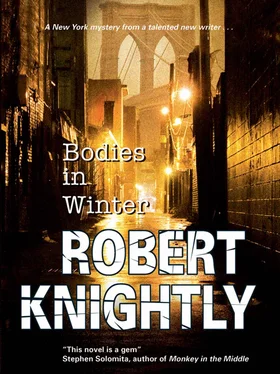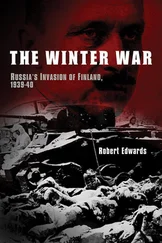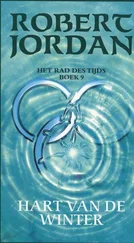Robert Knightly - Bodies in Winter
Здесь есть возможность читать онлайн «Robert Knightly - Bodies in Winter» весь текст электронной книги совершенно бесплатно (целиком полную версию без сокращений). В некоторых случаях можно слушать аудио, скачать через торрент в формате fb2 и присутствует краткое содержание. Жанр: Полицейский детектив, на английском языке. Описание произведения, (предисловие) а так же отзывы посетителей доступны на портале библиотеки ЛибКат.
- Название:Bodies in Winter
- Автор:
- Жанр:
- Год:неизвестен
- ISBN:нет данных
- Рейтинг книги:4 / 5. Голосов: 1
-
Избранное:Добавить в избранное
- Отзывы:
-
Ваша оценка:
- 80
- 1
- 2
- 3
- 4
- 5
Bodies in Winter: краткое содержание, описание и аннотация
Предлагаем к чтению аннотацию, описание, краткое содержание или предисловие (зависит от того, что написал сам автор книги «Bodies in Winter»). Если вы не нашли необходимую информацию о книге — напишите в комментариях, мы постараемся отыскать её.
Bodies in Winter — читать онлайн бесплатно полную книгу (весь текст) целиком
Ниже представлен текст книги, разбитый по страницам. Система сохранения места последней прочитанной страницы, позволяет с удобством читать онлайн бесплатно книгу «Bodies in Winter», без необходимости каждый раз заново искать на чём Вы остановились. Поставьте закладку, и сможете в любой момент перейти на страницу, на которой закончили чтение.
Интервал:
Закладка:
‘Evening, Conrad.’
‘Ah, I thought that was you I heard thrashing around in the pool.’
Conrad Stehle was closing in on seventy, a tall stocky man with the barrel chest of a true swimmer. He’d been a champion in high school, winning statewide tournaments six different times in three different categories. At one point, the now-defunct New York Herald Tribune had pronounced Conrad ‘a future Olympian’. Those dreams had come crashing down when he returned from the Korean War with a purple heart and lungs too weak to support active competition.
I peeled off my goggles and cap, then fished out my ear plugs. ‘I caught the David Lodge case. Did you hear about it?’
Conrad’s green eyes widened slightly and he tilted his chin in the air. A bit of a cop buff, he liked nothing more than to discuss an investigation, and I sometimes used him as a sounding board. Lodge’s celebrity, of course, only sweetened the mix.
‘Just let me dry off,’ I continued, ‘and I’ll be right back.’
Fifteen minutes later, when I returned, Conrad had a bottle of Cointreau sitting on his desk, along with two plastic cups. He poured an inch of the liquor into each cup, then passed one to me. ‘To crime and punishment,’ he said.
‘Amen to that, brother.’
I clinked plastic, drained the cup, then drew an outline of the investigation thus far, including my numerous misgivings. Though I’d meant to be brief, I found myself explaining my reaction to Adele’s maneuver with the Lodge file, my pending transfer to Homicide, and my equally pending promotion.
‘The reassignment and the promotion, Conrad, they’re both at the absolute discretion of the bosses.’
‘And that’s what you wish to protect?’
I shrugged. ‘I don’t care all that much about the promotion, although I could definitely use the money. But Homicide? Even as far back as the Academy, and we’re talking fifteen years here, I wanted to be a homicide detective. Now I’m only a few months away.’
Ordinarily, Conrad had the listening skills of a psychiatrist, but my whiny complaints, on that night, evoked no more than a slight toss of the head as he removed a stubby cigar from his shirt pocket and ran it beneath his nose. He’d stopped smoking on the day Helen, a chain smoker since adolescence, died of lung cancer.
‘I don’t think you’re worried about this file. I think you’re worried that you can’t control your partner.’
‘Yeah, there’s that, too. But I’m sure of one thing: if I play it by the numbers, I can’t get hurt.’
‘And those numbers include keeping Lieutenant Sarney informed?’
‘At all times, Conrad. At all times.’
I left Conrad’s office with a happy heart, and carried my good mood back to my apartment where I called Adele. It was a quarter to twelve and I knew she’d be watching the first half-hour of the Letterman show. Letterman was better, she’d told me, than a sleeping pill.
‘Adele,’ I said when she picked up the phone, ‘the Broom is dead.’
‘The broom?’
‘Patrol Officer Anthony Szarek, retired.’ I detailed my conversation with Linus Potter, laying heavy emphasis on the timing of Szarek’s suicide, just two weeks before Lodge’s scheduled release, and Szarek’s devotion to alcohol.
‘So what does this mean to us, Corbin?’ Adele asked when I finished.
‘According to Potter, Tony Szarek holds the case against Lodge together by putting Lodge alone with the victim. But who speaks for Tony Szarek?’
‘Nobody,’ Adele replied without hesitation, ‘and now he can’t speak for himself. But I’m still asking the same question. What does this mean to us?’
‘Szarek was a drunk. He was the weak link.’
‘I’m not disagreeing with you, Corbin, but it’s getting late.’
‘And you want me to come to the point?’
‘Please.’
‘The point is that the shit’s hit the fan, and I intend to maintain a low profile until I see if it’s aimed in my direction.’
‘This isn’t like you, Corbin.’
‘I don’t care. Everything goes across the lieutenant’s desk, every move we make. That way, the bosses can’t protect themselves without protecting us. Remember, it’s not just us. Sarney’s also at risk here.’
‘Yes,’ Adele finally admitted, ‘I could hear it in his voice.’
EIGHT
I know what I expected as I approached the Attica Correctional Facility in my rented Plymouth: soot-stained granite walls, ancient and forbidding, topped by coil upon coil of gleaming razor wire. But Attica’s walls weren’t soot-stained, or topped by wire, or made of granite. They were poured concrete and they appeared, from a distance on that day, as white as the fields of snow surrounding them. The effect was more Camelot than Tower of London, an illusion compounded by octagonal guard towers set into the walls like rooks at the corners of a chess board. Imposing in themselves, the towers were large enough to accommodate fully enclosed rooms behind their battlements, rooms to which the guards undoubtedly retreated on frigid winter days. These rooms were topped by funnel-shaped roofs covered with festive orange tiles.
From inside the Plymouth, with the heater running on high, it was a beautiful day. The sun at my back fired the edges of the undulating dunes with a wavering line of pure silver. The sky ahead was intensely blue and seemed to grow directly from the prison walls. Even the few sunlit clouds, though clearly in motion, could have been details in a painted backdrop.
But I wasn’t going to be able to stay inside the car, enjoying the picture-postcard scenery, a fact of life that became painfully obvious when I finally turned into a parking lot surrounded by snow banks higher than my head. The temperature outside was minus six degrees, the sun no warmer than an uncooked egg yolk, the winds strong enough to stir up mini-tornados of snow. I was wearing a really nice wool coat, a coat suitable for a Broadway show or an uptown dinner. But when I stepped from the car — bravely, I thought — my coat afforded me all the protection of a terrycloth robe.
By then, thanks to a long delay while airport security cleared my weapon, I knew a lot more about David Lodge. The wait had left me plenty of time to read New York’s three daily papers, each of which had uncovered a different piece of the investigation Adele and I were conducting.
A Times reporter named Gruber had somehow wangled an interview with Ellen Lodge. Her husband, she’d told Gruber, had claimed, on more than one occasion, to fear a revenge-motivated attack. According to Ellen, ‘He was wired when he left the house. I could see that.’
Eva Hinckle made an appearance in the Daily News where she described Lodge’s murderers as ‘black males’. According to the reporter covering the story, Carl Gonzalez, Eva was certain because (as she only now remembered) the ski mask worn by one of Lodge’s assailants had slipped as he got into the red car, exposing the back of his neck.
The New York Post hadn’t gotten to any of the witnesses. Instead, a ‘highly placed source within the NYPD’ had told a reporter named Ted Loranzo about the location of the abandoned Toyota and the TEC-9’s recovery. The main focus of Loranzo’s story was the relationship between the TEC-9 (which Loranzo described as a ‘machine pistol’) and gangster rap. Profusely illustrated with photos culled from album covers depicting black men holding TEC-9s, the text made no effort at subtlety. The police, Loranzo told his readers, were concentrating their efforts on friends and associates of Clarence Spott.
So, the cat was out of the bag. All those blatant clues were never meant to fool the investigators unfortunate enough to catch the case. They were there because reporters need blatant clues in order to write slanted stories. Stories that somehow failed to mention Ellen Lodge’s evasiveness, or Otto Hinckle’s observations, or the convenient placement of the Toyota. Had Loranzo asked himself why Lodge’s killers didn’t park the car legally? If they had, the car might not have been discovered for weeks and would almost certainly have been stripped of anything as valuable as a TEC-9 by the time it was.
Читать дальшеИнтервал:
Закладка:
Похожие книги на «Bodies in Winter»
Представляем Вашему вниманию похожие книги на «Bodies in Winter» списком для выбора. Мы отобрали схожую по названию и смыслу литературу в надежде предоставить читателям больше вариантов отыскать новые, интересные, ещё непрочитанные произведения.
Обсуждение, отзывы о книге «Bodies in Winter» и просто собственные мнения читателей. Оставьте ваши комментарии, напишите, что Вы думаете о произведении, его смысле или главных героях. Укажите что конкретно понравилось, а что нет, и почему Вы так считаете.












